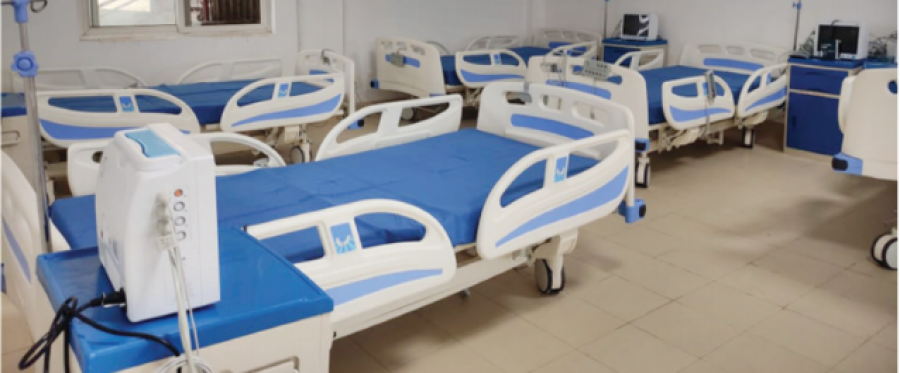National
Rs23 billion spent on Covid-19 prevention and control measures in two years, survey shows
While new beds were added, health institutions and the medical workforce hardly saw any increase.
Prithvi Man Shrestha
Since the start of the Covid-19 pandemic last year, the three layers of the government have spent a total of Rs23.16 billion on Covid-19 prevention and control measures until April-end, according to the Economic Survey 2020-21 unveiled on Friday.
The federal government had allocated Rs34.11 billion for the three tiers of government through Covid-19 funds and regular budgetary allocations in the two fiscal years to fight the pandemic.
The federal government spent over Rs10 billion while provincial and local governments spent Rs3 billion and Rs9 billion respectively, according to the Economic Survey released by the Finance Ministry.
The survey shows that a majority of the budget was spent on quarantine beds, isolation beds, intensive care units (ICUs), ventilators and high dependency units (HDUs).
According to the survey, a total of 22,127 quarantine beds, 13,700 isolation beds, 1,154 ICU beds, 475 ventilators and 676 HDUs were added since the pandemic began.
“Even though the government added hospital beds and equipment, failure to work in the community to prevent the spread of coronavirus has undermined efforts to control the pandemic,” said Dr Binjwala Shrestha, assistant professor at the department of community medicine at the Institute of Medicine, Tribhuvan University.
With 6,855 new infections reported in the last 24 hours, the total number of Covid-19 cases in the country has reached 549,111. The total deaths reached 7,047 on Friday.
In the first eight months of the current fiscal year, very few health institutions were added, according to the Economic Survey. Only 57 health institutions were added since the start of the current fiscal year, the survey report says.
There were 7,154 health institutions until mid-July last year and by mid-March their number had reached to just 7,221.
As many as 3,468 hospital beds were added in the first eight months of the current fiscal year overall, including for both Covid-19 and other purposes, according to the Economic Survey.
“Physical construction of health institutions could hardly take place in the current fiscal year due to the continued presence of the coronavirus and lack of movement of people and goods to complete the construction work,” said Dr Gunaraj Lohani, chief of policy, planning and monitoring division at the Health Ministry.
According to Lohani, over 300 basic hospitals are in the process of construction in several local units.
In December last year, the government had laid the foundation for the construction of 300 hospitals with capacity of 5-15 beds each in various local units on a single day as a part of an inauguration drive. None of them have been completed.
“Many are in the procurement process before they enter the construction phase,” said Gunaraj Lohani, joint secretary at the Health Ministry.
The proposed basic hospitals, which are to be constructed in 397 local units, are set to be completed in the next two years. They will add 8,000 new beds.
According to the survey report, the government also failed to add new permanent human resources which resulted in a reduction of human resources in the time of the pandemic.
There were 90,946 health workers until mid-July last year and their number decreased to 90,369 by mid-March this year.
Lohani said that fresh recruitment could not be made due to lack of leadership at the Public Service Commission at both central and provincial levels.
In Lumbini Province, the efforts to recruit health workers by the provincial authority was thwarted by a legal case.
Lumbini Province’s move to recruit 125 staff, mostly health workers, in October last year had landed in court as some disgruntled government employees filed writ petitions at Butwal High Court and the Supreme Court.
“We had to recruit health workers on contract basis to address the staff crunch in the time of pandemic,” said Lohani.




 11.84°C Kathmandu
11.84°C Kathmandu













